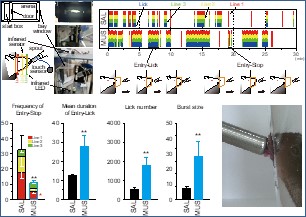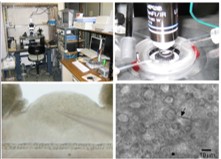Oral Physiology (JP)
この教室に関連するワード
- 口腔生理学
- 摂食行動
- 嘔吐
- 神経科学
- 味覚


生体のホメオスタシスにおける口腔機能の意義について明らかにすることを目指して研究を展開している。特に摂食行動、嘔吐、味覚、学習の中枢機構と調節機序について神経科学の見地から次のような研究を行っている。
- イオンチャネルおよびレセプターの研究
ラット新鮮脳スライス標本を用いて、神経連絡、伝達物質、薬物感受性、イオンチャネルおよびレセプターの活性と単一ニューロンの活動制御の解析を行っている。 - 行動科学的研究法による情動行動の解析
顎顔面口腔領域の感覚および機能と情動行動との相互連関について明らかにするためにオペラント行動の解析を行っている。 - 免疫組織化学的研究法による脳機能解析
c-Fosタンパクの発現を指標に学習に関与する中枢ニューロンの解析を行っている。 - 味覚の中枢処理機構
舌から脳幹を介して大脳皮質や辺縁系へ伝達される味覚情報の伝達回路と摂食行動の表出に関わる神経回路が連携する仕組みを神経科学的手法により調べている。 - 味覚の学習・記憶の神経メカニズム
味覚嫌悪学習を実験モデルとして、その獲得や想起に関わる中枢神経機構の解明に取り組んでいる。味覚体験に関連する行動変容(好き嫌い)と不安・恐怖の表出との連関の仕組みを解き明かそうとしている。
担当教員
Makoto Funahashi

